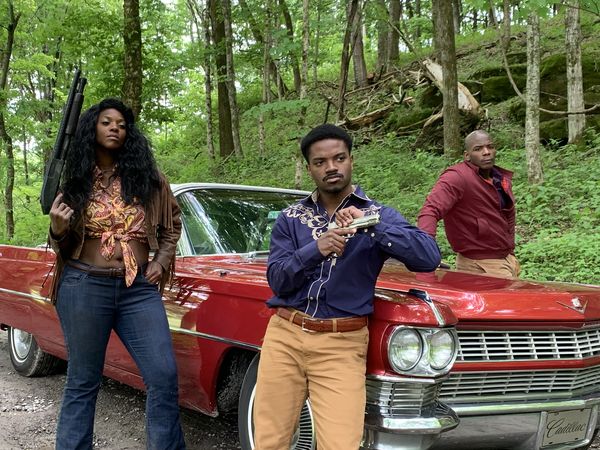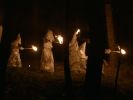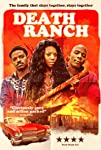Eye For Film >> Movies >> Death Ranch (2020) Film Review
Death Ranch
Reviewed by: Jennie Kermode

You'll know within the first five minutes whether you're wasting your time with Death Ranch or whether you're going to want to watch it several more times within the next week. There isn't much in between. The clothes, the hair, the way the camera captures the moisture in the air, the car - oh, the car - and the jaunty angles at which it is shot make it immediately clear that this is cinema made by people who know exactly what they're doing. It's a spirited piece of grindhouse work full of bloody violence and exploitation tropes, made with love.
Deiondre Teagle is Brandon, a young man on the run. He's recently broken out of prison and his siblings Angela (Faith Monique) and Clarence (Travis Cutner) are determined to help him. The former believes passionately in his innocence. The latter is not that naïve. Unfortunately they have made a poor choice of hiding place - a dilapidated barn on what they thought was an abandoned ranch somewhere in the Deep South. In fact, it's the favourite haunt of a gang of very active Ku Klux Klan members, and when Brandon interferes in one of their rituals, trying to save a frightened young woman, the stage is set for conflict. But this isn't just a film about white people hurting black people (some more). Where it comes alive is with Brandon's revenge.

European cinema - and especially British cinema - is full of depictions of Nazis being made to suffer, often in humiliating ways. It doubtless says something about the culture of the US that its cinema has produced remarkably little equivalent material. Death Ranch makes up for lost time. Whilst not a film for the faint hearted, it's also OTT to a degree that may put off those who want to take their violent horror seriously, but what it (often deliberately) lacks in execution it more than makes up for in executions. For viewers who have simply had enough of dealing with racism and extreme right wing hostility in general, it's tremendously cathartic. Watched in a group, it will evoke cheers of delight as one deserving hood-wearer after another is shot, stabbed, impaled, kicked, punched, forced to eat select portions of his own body (did I mention that this is a cannibal KKK clan?) or otherwise anatomically rearranged. It may be fiction, but on days when watching Nazis get punched on YouTube isn't enough, this hits the spot.
It's structurally as well as viscerally messy. There are moments when you will step back and wonder at what you are watching with some concern. A scene depicting sexual assault, for instance, has its place in genre tradition but is fundamentally problematic - or would be were it not carefully shot to avoid any possibility of titillation, and if it didn't provide the justification for Angela to leave behind her seeing-the-best-in-people past and transform into a kick-ass heroine. Monique, like Teagle, has the kind of deep, intrinsic understanding of her character that suggests she grew up with this stuff, and her performance is spot on. The energy between the two is fantastic and ensures that there's an undercurrent of positive emotion here, keeping the film from descending into bitterness.
There's not much to the story. if you're familiar with the genre then it won't do much to surprise you. The effects are cheap and cheerful and, in the end, most of what it offers by way of entertainment is some people in silly clothes running around in a field, but that's where the magic happens, because director Charlie Steeds hardly gives you time to notice. He's having fun, and if you're willing to get into the spirit of it, so will you. it's actually really hard to pull off this kind of story and make it work for an audience, but Steeds has done it. It's packed with thrills and comedy, but for some viewers, watching it will also deliver a feeling of sheer relief.
Reviewed on: 20 Apr 2021


















